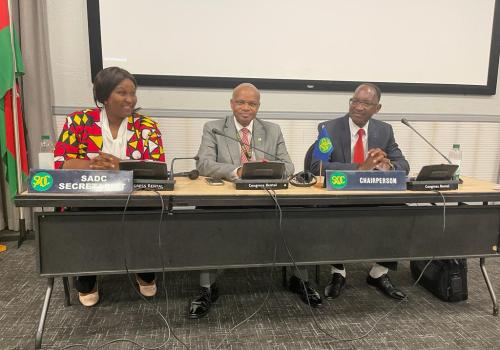Corruption continues to inflict significant damage to economic and social development of the Southern African Development Community (SADC) Region and undermining transparency, accountability and the rule of law, the Acting Director of the SADC Organ on Politics, Defence and Security Affairs, Ms Kealeboga Moruti, has said.
Speaking at the opening of the meeting of heads of SADC Anti-Corruption Agencies in Johannesburg, South Africa, Ms Moruti said the nexus between corruption and peace and security in the Region cannot be overlooked. The SADC Heads of Anti-Corruption Agencies met from the 23th-25th November 2022, hosted by the Special Investigating Unit (SIU), under the theme “Strengthening Regional Co-operation and capacity to address corruption”.
Ms Moruti said corruption has the potential to undermine peace and stability of SADC Member States and exacerbate inequalities as it leads to unequal distribution of wealth and capacity of Member States to deliver socio-economic development equitability to secure a better life for all citizens.
She, however, noted that progress continues to be made at the Regional level to strengthen cooperation and capacity to address corruption within the framework of the Strategic Anti-Corruption Action Plan for 2018-2022 which will soon be succeeded by the 2023-2027 plan. There is also a lot of work which is being done at the Member State level and the annual SADC Anti-Corruption Sub Committee meetings have provided an important platform for tracking progress in the implementation of Regional efforts and consolidation of the SADC regional agenda and efforts.
Fighting corruption requires cooperation not just between Member States but also strengthening cooperation and coordination of efforts between various partners. The Secretariat is currently engaged with partners such as UNODC in developing a new framework of cooperation after the Joint Regional programme which ends in 2023. The Secretariat is also engaged with the African Union Advisory Board on Anti-Corruption plus other key partners in areas of collaboration.
Dr Paulus Noah, Chairperson of the SADC Anti-Corruption Sub Committee, said all heads of anti-corruption agencies have been waiting for the operationalisation of the Committee since the entry into force of the SADC Protocol Against Corruption in 2005 because it is a transmitting belt for the coordination of anti-corruption activities in the Region.
He saluted the SADC Secretariat for the efforts made towards the realisation of the Agreements Amending the SADC Protocol on Politics, Defence and Security Cooperation as well as the SADC Protocol against Corruption, adding that corruption in the Region remains a challenge that needs to be addressed in unison as it undermines good governance and the principles of accountability.
Mr Noa commended the German Government, through GIZ, and the European Union, through the Support to Peace and Security in the SADC Region (SPSS) programme, for their support to strengthen regional cooperation and develop capacity in addressing corruption.
The objective of the meeting of SADC Anti-Corruption Agencies was to discuss emerging trends in corruption and strengthening cooperation in the fight against the scourge and to strengthen implementation of the SADC Strategic Anti-Corruption Action Plan (2023-2027) as well as share experiences and best practices. It was attended by the Heads of Anti-Corruption Agencies or their representatives from Angola, Botswana, Democratic Republic of Congo, Eswatini, Lesotho, Madagascar, Mauritius, Malawi, Namibia, Seychelles, South Africa, United Republic of Tanzania, Zambia and Zimbabwe.
Among other issues, the meeting agreed on the need for SADC Heads of Anti-Corruption agencies to continue having dialogues on an annual basis organised around key thematic areas based on emerging Anti-Corruption issues and trends. SADC Anti-Corruption agencies pledged to continue to share best practices to facilitate strengthening of regional cooperation and capacity in fighting against corruption and also to facilitate creating mechanisms that will make cooperation among them flexible to speed up their anti-corruption work.
The Anti-Corruption Agencies also agreed that they need to be capacitated on an on-going basis, particularly in emerging trends and issues that require new skills and capacities for them to effectively respond to the evolving nature of corruption and other related crimes which corruption facilitates. It was also agreed that there is a need to enhance collaboration with the SADC Parliamentary Forum in enhancing the role of parliaments to use their constitutional mandate in fighting corruption and also domestication of the Protocol against Corruption and other instruments.

